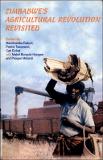| dc.contributor.author | Pazvakavambwa, Simon C. | |
| dc.contributor.author | Hakutangwi, Marcus B.K. | |
| dc.coverage.spatial | Zimbabwe. | en |
| dc.date.accessioned | 2016-03-09T11:40:50Z | |
| dc.date.available | 2016-03-09T11:40:50Z | |
| dc.date.issued | 2006 | |
| dc.identifier.citation | Pazvakavambwa, S.C. and Hakutangwi, M.B.K. (2006) Agricultural extension. In: Rukuni, M., Tawonezvi, P. and Eicher, C. (eds.) Zimbabwe's agricultural revolution revisited. UZ, Mt. Pleasant, Harare: UZ Publications, pp. 217-235. | en |
| dc.identifier.isbn | 0869241419 | |
| dc.identifier.uri | https://opendocs.ids.ac.uk/opendocs/handle/20.500.12413/9942 | |
| dc.description | A research paper on agricultural extension services to Zimbabwe's farmers. | en |
| dc.description.abstract | Agricultural extension is the process of transferring agricultural information and technology to farmers for use in production and marketing decisions and similarly transferring information from farmers to researchers (Swanson, 1984; Eicher, 2002). It is essentially a two-way link where extension agents transfer knowledge and ideas to farmers and their families in an advisory role. By the same token, extension agents should be receptive to farmers’ ideas, suggestions and problems so these can be incorporated into the extension message and passed on to researchers. For an agricultural revolution to succeed and be sustainable, farmers should have proper skills and access to knowledge that can be generated through research and imparted through extension. The agrarian structure that has emerged since 2000 possesses new challenges for the capacity of both public and private institutions to meet the extension demands presented by the massive land transfers.126
Historically, the public sector provided most of the extension services but the economic structural adjustment programmes implemented in the 1990s reduced funding for public extension and emphasized cost recovery and privatization. Extension was weakened by increasing fiscal constraints whilst extension providers covered too wide an area and range of activities amidst poor linkages with research. Institutional reforms that took place in 2002 were designed to ameliorate weak research-extension linkages. This chapter recaps the role of extension before independence and in the first two decades of independence, discusses its current status and provides pointers to the future of extension in the next decade. | en |
| dc.language.iso | en | en |
| dc.publisher | University of Zimbabwe (UZ) Publications. | en |
| dc.rights.uri | http://creativecommons.org/licenses/by-nc-nd/3.0/ | en |
| dc.subject | Agriculture | en |
| dc.subject | Rural Development | en |
| dc.title | Agricultural extension | en |
| dc.type | Book chapter | en |
| dc.rights.holder | University of Zimbabwe (UZ) | en |


